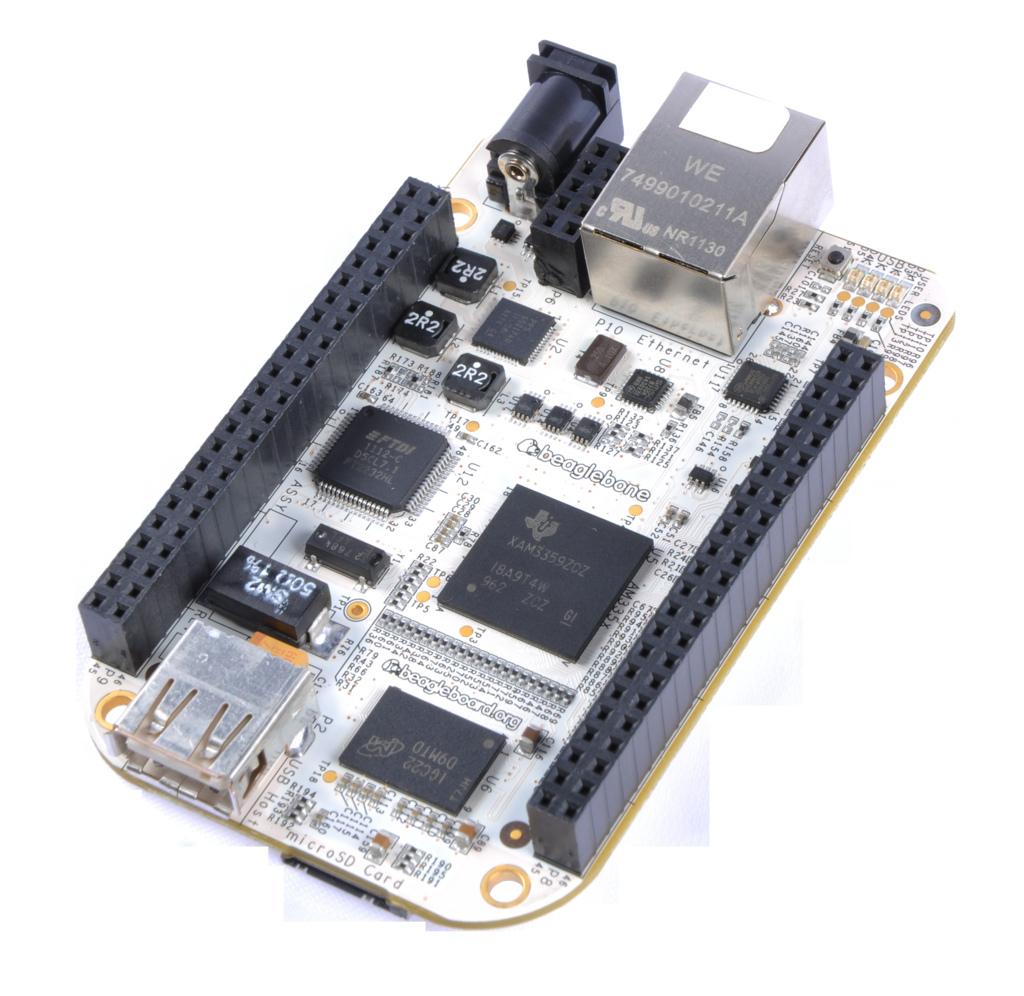Finally, the beaglebone, I ordered last month, is arrived at home!!!!
For those who don't know what is the beaglebone, some text from the wikipedia could be useful:
"Announced in the end of October 2011, the BeagleBone is a barebone development board with a Sitara ARM Cortex-A8 processor running at 720 MHz, 256 MB of RAM, two 46-pin expansion connectors, on-chip Ethernet, a microSD slot, and a USB host port and multipurpose device port which includes low-level serial control and JTAG hardware debug connections, so no JTAG emulator is required…….
…..A number of BeagleBone "Capes" have recently been released. These capes are expansion boards which can be stacked onto the BeagleBone Board (up to four at one time). BeagleBone capes include but are not limited to:
- LCD touch screen Capes (7" and 3.5")
- DVI-D Cape
- Breakout Cape
- Breadboard Cape
- CANBus Cape
- RS232 Cape
- Battery Cape
"
I want to be clear, this is not a Getting Started Guide. This is a simple article showing what you'll get after the board arrives at home. If you want to get started, please refer to http://beagleboard.org/static/beaglebone/latest/README.htm
In the above README you will find how to connect the beaglebone to your PC (no matter if you are using win, linux or mac os x).
I will start the story with the beaglebone board up, running and connected to my laptop through the USB cable. With my favourite ssh client I logged into the beaglebone, in the following few lines there are the parameters I used:
IP ADDRESS = 192.168.7.2
USERNAME = root
PASSWORD = root
Once logged in, I have the following prompt:
root@beaglebone:~ #
Let's start with the OS configuration, the kernel is the kernel version 3.2.28
# uname -a
Linux beaglebone 3.2.28 #1 Tue Sep 11 13:08:30 CEST 2012 armv7l GNU/Linux
The networks are UP and Running as follows:
root@beaglebone:~/Desktop# ifconfig
eth0 Link encap:Ethernet HWaddr 00:18:31:92:78:5C
UP BROADCAST MULTICAST MTU:1500 Metric:1
RX packets:0 errors:0 dropped:0 overruns:0 frame:0
TX packets:0 errors:0 dropped:0 overruns:0 carrier:0
collisions:0 txqueuelen:1000
RX bytes:0 (0.0 B) TX bytes:0 (0.0 B)
lo Link encap:Local Loopback
inet addr:127.0.0.1 Mask:255.0.0.0
inet6 addr: ::1/128 Scope:Host
UP LOOPBACK RUNNING MTU:16436 Metric:1
RX packets:8 errors:0 dropped:0 overruns:0 frame:0
TX packets:8 errors:0 dropped:0 overruns:0 carrier:0
collisions:0 txqueuelen:0
RX bytes:504 (504.0 B) TX bytes:504 (504.0 B)
usb0 Link encap:Ethernet HWaddr D2:A4:80:98:7D:46
inet addr:192.168.7.2 Bcast:192.168.7.3 Mask:255.255.255.252
inet6 addr: fe80::d0a4:80ff:fe98:7d46/64 Scope:Link
UP BROADCAST RUNNING MULTICAST MTU:1500 Metric:1
RX packets:745 errors:0 dropped:0 overruns:0 frame:0
TX packets:283 errors:0 dropped:0 overruns:0 carrier:0
collisions:0 txqueuelen:1000
RX bytes:108888 (106.3 KiB) TX bytes:94585 (92.3 KiB)
The current processes show something interesting:
root@beaglebone:~/Desktop# ps xa
PID TTY STAT TIME COMMAND
1 ? Ss 0:00 /sbin/init run_hardware_tests
2 ? S 0:00 [kthreadd]
3 ? S 0:00 [ksoftirqd/0]
5 ? S 0:00 [kworker/u:0]
6 ? S< 0:00 [khelper]
7 ? S 0:00 [kdevtmpfs]
8 ? S< 0:00 [netns]
9 ? S 0:00 [sync_supers]
10 ? S 0:00 [bdi-default]
11 ? S< 0:00 [kintegrityd]
12 ? S< 0:00 [kblockd]
13 ? S< 0:00 [omap2_mcspi]
14 ? S 0:00 [khubd]
15 ? S< 0:00 [musb-hdrc.0]
16 ? S< 0:00 [musb-hdrc.1]
17 ? S< 0:00 [rpciod]
18 ? S 0:00 [khungtaskd]
19 ? S 0:00 [kworker/0:1]
20 ? S 0:00 [kswapd0]
21 ? S 0:00 [fsnotify_mark]
22 ? S< 0:00 [nfsiod]
23 ? S< 0:00 [crypto]
31 ? S< 0:00 [OMAP UART0]
32 ? S< 0:00 [OMAP UART1]
33 ? S< 0:00 [OMAP UART2]
34 ? S< 0:00 [OMAP UART3]
35 ? S< 0:00 [OMAP UART4]
36 ? S< 0:00 [OMAP UART5]
37 ? S< 0:00 [smflush]
38 ? S 0:00 [kworker/u:1]
41 ? S< 0:00 [kpsmoused]
42 ? S 0:00 [w1_bus_master1]
43 ? S< 0:00 [devfreq_wq]
44 ? S 0:01 [mmcqd/0]
45 ? S 0:00 [jbd2/mmcblk0p2-]
46 ? S< 0:00 [ext4-dio-unwrit]
51 ? Ss 0:00 /lib/systemd/systemd-journald
56 ? Ss 0:00 /lib/udev/udevd
60 ? S 0:00 [kworker/0:2]
69 ? S< 0:00 [krfcommd]
85 ? Ss 0:00 /usr/sbin/connmand -n
86 ? Ss 0:00 avahi-daemon: running [beaglebone.local]
91 ? Ss 0:07 /usr/bin/node4 /usr/share/cloud9/bin/cloud9.js -l 0.0.0.0 -w /var/lib/cloud9 -p 3000
92 ? Ssl 0:11 /usr/bin/node bone101.js
93 ? Ss 0:02 /usr/bin/python gateone.py
94 ? Ss 0:00 /lib/systemd/systemd-logind
97 ? Ss 0:00 /usr/sbin/crond -n
107 ? Ss 0:00 /usr/bin/dbus-daemon --system --address=systemd: --nofork --systemd-activation
119 ? S 0:00 avahi-daemon: chroot helper
225 ? S 0:00 /lib/udev/udevd
235 ? S 0:00 /usr/sbin/wpa_supplicant -u
247 ttyO0 Ss+ 0:00 /sbin/agetty -s ttyO0 115200
261 ? S 0:00 [flush-179:0]
272 tty1 Ss+ 0:00 /sbin/agetty tty1 38400
273 ? Ssl 0:00 /usr/sbin/gdm-binary -nodaemon
320 ? S 0:00 /lib/udev/udevd
324 ? Ss 0:00 /usr/sbin/udhcpd -f -S /etc/udhcpd.conf
343 ? Ss 0:01 /usr/sbin/dropbear -i -r /etc/dropbear/dropbear_rsa_host_key -p 22
344 pts/0 Ss 0:00 -sh
366 pts/0 R+ 0:00 ps xa
1. The cloud9 IDE is ready, point your browser to 192.168.7.2:3000 to give a try.
2. UART 0/1/2/3/4/5 should be ready
3. agetty is running on UART0 (115200 baud/s) and on UART1 (38400)
4. The micro dhcp server is up and running with the options described into the /etc/udhcpd.conf file
5. an SSH 2 server (dropbear) is up and running.
As usual, since I'm a programmer, I'm interested in developing so I have to know something about the toolchain installed into the micro sdcard.
root@beaglebone:~/Desktop# make --version
GNU Make 3.82
Built for arm-angstrom-linux-gnueabi
Copyright (C) 2010 Free Software Foundation, Inc.
License GPLv3+: GNU GPL version 3 or later <http://gnu.org/licenses/gpl.html>
This is free software: you are free to change and redistribute it.
There is NO WARRANTY, to the extent permitted by law.
root@beaglebone:~/Desktop# gcc --version
gcc (GCC) 4.5.4 20120305 (prerelease)
Copyright (C) 2010 Free Software Foundation, Inc.
This is free software; see the source for copying conditions. There is NO
warranty; not even for MERCHANTABILITY or FITNESS FOR A PARTICULAR PURPOSE.
For now that's all,
keep in touch for new articles about this fantastic board.
Gg1

